Pre-construction planning is the most critical stage for projects involving home remodeling at Kitchen and Bath Beyond.
It's crucial to avoid diving into a home remodeling project without fully understanding all the potential costs and problems. This phase serves as the foundation for the entire project, ensuring that it runs smoothly, on time, and within budget. Pre-construction planning involves defining the project, identifying potential issues, planning and scheduling, establishing the scope of work, estimating costs, and analyzing all necessary requirements. Let's explore each aspect in detail to understand how this process benefits both contractors and clients.
1. Defining the Project
The first step in pre-construction planning is clearly defining the project. This includes determining the client’s vision, goals, and needs. For a Kitchen Bath and Beyond project, this might involve decisions about design aesthetics, space utilization, preferred materials, and specific functionalities. A well-defined project minimizes confusion down the line and ensures that all stakeholders—contractors, designers, and clients—are on the same page.
2. Identifying Potential Issues
During the planning stage, contractors assess any potential challenges that could arise during the project. This might involve site conditions, existing structural limitations, or compliance with local building codes. For KBB projects, common issues might include plumbing complications, electrical systems, or hidden damages in existing structures. Identifying these risks early helps mitigate costly surprises once construction begins.
3. Planning and Scheduling
Creating a comprehensive schedule is essential to keep the project on track. Contractors outline each phase of the project, from demolition to final installation, and set realistic deadlines for each step. For example, in a kitchen renovation, this could include planning for plumbing, electrical work, cabinetry installation, and countertop fitting. By laying out a clear timeline, contractors can coordinate tradespeople efficiently, and clients can anticipate how long the project will take.
4. Establishing the Scope of Work
The scope of work defines what the construction team will—and won’t—do. This is crucial to avoid scope creep, where additional tasks are added during the project that weren’t initially planned for. For example, if a bathroom renovation initially involves just a vanity replacement but later expands to include a full shower remodel, the scope must be adjusted accordingly. Defining the scope early helps set expectations and avoids potential disputes.
5. Cost Estimation
A detailed cost estimate is essential for both the contractor and the client. In this phase, contractors calculate material, labor, and overhead costs. Costs can vary widely, but here’s an example of the average cost for a kitchen remodel. This estimate helps the client understand the financial commitment required for the project and allows them to make informed decisions on material selections, design changes, or budget adjustments before construction begins.
6. Analyzing Requirements
Finally, pre-construction planning involves a thorough analysis of all requirements needed to complete the project. This includes permits, material lead times, and coordination with subcontractors. For KBB projects, it’s also essential to consider product-specific timelines, such as custom cabinetry or countertops, which may take weeks or months to fabricate. By analyzing these requirements early on, contractors can ensure that the project runs smoothly without unnecessary delays.
The Benefits of Pre-Construction Planning
Effective pre-construction planning helps clients understand, prioritize, and make informed decisions about their construction project. It allows for clear communication, minimizing misunderstandings between contractors and clients. Moreover, by identifying potential issues and addressing them early, pre-construction planning helps to avoid costly delays or budget overruns, ultimately leading to a more successful and stress-free project.
For KBB projects, where custom designs and specialized installations are common, pre-construction planning is especially valuable. It helps ensure that clients get the functionality and aesthetics they desire while keeping the project on schedule and within budget.
By engaging in a thorough pre-construction process, clients can set their KBB projects up for success, ensuring that the final result meets their vision and expectations without unnecessary hiccups along the way.






